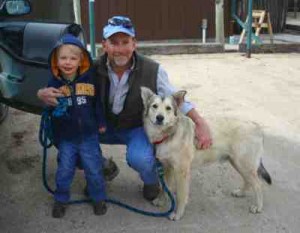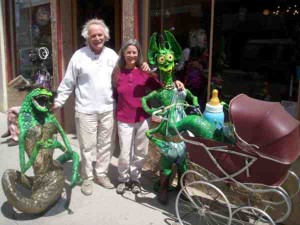Review by Ed Quillen
Agriculture – June 2008 – Colorado Central Magazine
Melancholy Green Giants
by J.C. Mattingly
Published in 2007 by Mirage Publishing
ISBN 978-0-9710430-3-9
THIS IS FICTION, but it’s not exactly a novel. It’s more like getting to hang around a group of characters as they meet the challenges of Colorado agriculture in a fictional landscape — as best as I could guess, somewhere north of Fort Collins where the Great Plains run into the hogbacks and foothills of the Front Range.
The main character is Herman Zweep, who stands 7 feet 8 inches tall and weighs 435 pounds. He can pick up an engine block in each hand and tote them across the room. He collects junk and he’s a creative mechanical type who generally finds a use for it.
He’s the center of a small group of neighboring farmers, the guy they all rely on when something comes up — be it irrigation water, planting methods for barley, parts for their old machinery, lawyers, or a county road that gets in the way of sensible farming.
As the book starts, Zweep has a wife, Rea, and a son, Noay, as well as a love child named Linda, whose mother was a belly-dancer in a traveling circus.
The chapters focus on various other farmers, who often gather in Zweep’s shop at the end of the day to swap lies and drink a little Grain Belt. That seems odd since Grain Belt was never a prominent Colorado beer, but they seem to have little use for Coors. I had to wonder: did Coors at some point refuse to buy their barley? Or was their variety of barley unsuited for malting?
I never found out. Nor did I learn much about the marketing of their other crops, like corn, beans, and sugar beets. But I did learn plenty about farm machinery, as these guys cherish their old Moline tractors and Massey-Ferguson cultivators, and are always tinkering with them to improve performance or adapt to soil humidity on a given planting day.
As readers of this magazine know, Mattingly is a great story-teller with an eye for detail and an ear for dialog:
The 19th of July was drier than a popcorn fart. Only moisture in the air was sweat. The last good rain had been so long ago and had done so little it left no mark on anyone’s memory. The hot winds started in early July 7, day after day of 25 to 35 miles an hour, and mid-day temperatures over a hundred. Corn wilted with irrigation water standing in the furrows; barley shriveled right next to the ditches; bean vines curled; beet tops lay down flat on the ground, as if begging for shade.
But anyone driving the north end of Afton Hill could tell this part of the country was run by proud and diligent farmers. Ed, Sam, Bunkee, Harvey, and Herman were working around the clock, running water out every ditch, diversion, siphon tube, or piece of pipe they could get their hands on. They moved dams, checked rows, patched washouts, shoveled dikes, racing up and down their field roads to keep their crops alive. They couldn’t let the water run long enough to really soak the ground, they had to push over it quickly, wet the surface, save the crop, and move on. Move on, move on. Then start over again without missing a step.
They’d all seen conditions like this before. Hot winds come and go, scorching suns burn out. They knew the Hell Card was in the deck, and when dealt, it had to be played. When they ran into each other across a fencerow, they leaned on their shovels for a short break.
“Hot enough for you?”
“Hell comes at us, we bow our necks, get through it, forget it.”
“I’m lookin’ goddamned forward to forgettin’ about it.”
“Wanna join the Rainwatchers Club? We get up real early in the morning, go out with binoculars, try to spot raindrops.”
“Seen any?”
“One, but wasn’t for sure.”
They never complained. If one did, it put a drag on the spirits of the others. Nobody needed to be told it was tough. It was tough. And they worked like dogs, except Herman’s hound Ralph, who lay in the irrigation ditches panting, water up to his neck.
If there’s such a thing as “chick lit,” then you can classify Melancholy Green Giants as “guy lit.” Nearly all the characters are male, and the focus is on “guy stuff” — mostly machinery and masculine banter. The only marriage that’s really an agricultural partnership ends in the wife’s tragic death, and Rea leaves Herman long before the end of the book.
Sometimes the farmers meet their challenges through cleverness and creativity, sometimes by plain dumb luck, as when the farmer who’s got some trouble with his bank loan finds a can full of gold coins. Their water problems get solved, more or less, thanks to some outlaws of yore and a quirk of Colorado’s arcane water laws.
While I generally enjoyed reading this, it never quite worked as a novel for me. It has a sequence of interesting episodes, but no real plot to tie it together, nor much in the way of character development.
“Melancholy Green Giants” offers a spare 182-page glimpse into farm life — complete with jokes and anecdotes. For the most part, the dialog, narrative and tone are light and amusing, and the farmers almost mythically overcome all of their difficulties. But I was left with the feeling that there was something tragic about the lives of these characters, and about the fate of the world they belonged to. I wasn’t sure what was wrong, though. Reading this book was sort of like hanging out with the guys at the feed store or saloon — lots of tales, most of them based somewhat on truth, with some great one-liners about the ups and downs of life in general. There are a lot of worse ways to spend an afternoon.
But a lot of their story seemed to be missing. So in the end, I didn’t know whether to be grateful to the author for sparing me the details, or disappointed because he’d left out the meat of the tale.


